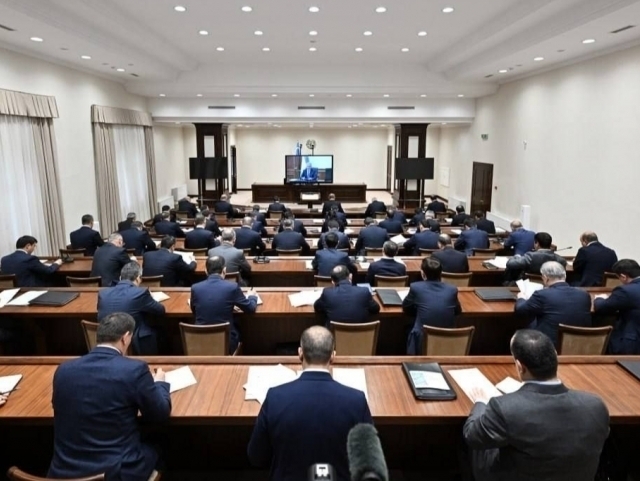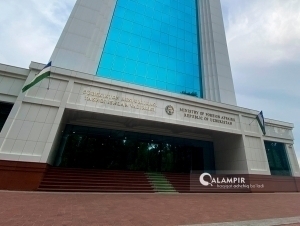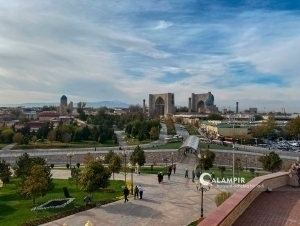State property worth 30 trillion sums to be sold in Uzbekistan
Local
−
27 March 2025 14645 5 minutes
This year, state property worth 30 trillion sums will be sold, ensuring at least 10 trillion sums in revenue for the budget. This was announced today, March 27, at an expanded meeting to discuss this year's priority tasks for the privatization of state property, held by President Shavkat Mirziyoyev.
It was noted that large-scale work is being carried out on privatization in order to develop entrepreneurship and effectively use land and facilities. In 2021-2024, state assets worth 47 trillion sums were sold. This is 30 times more than in the previous decade.
As a result, the number of enterprises with state participation decreased by two times, and the state's share in the economy decreased by 13 percent. The efficiency of privatized property has also increased several times.
Previously, mainly small enterprises and facilities were sold, but now large state assets are also being put up for sale. In particular, such large enterprises as Kungrad Soda Plant, Foton, Temiryolkonteyner, and the International and Lotte hotels were privatized.
Last November, for the first time, more than 3 million shares of the Commodity Exchange were sold to the public through a "people's IPO," and 11 thousand people became shareholders.
"However, there are still many shortcomings in the system, and many unused opportunities in regions and sectors. There are delays in converting vacant land into economic assets and selling finished buildings put up for auction," the report says.
For example, 1.5 thousand hectares of land put up for auction without studying the specialization of the territory and the possibility of laying communications have not been sold for more than a year. The agreement processes for putting up 4 thousand land plots for auction have been delayed. Ministers and governors have not transferred 243 properties that were supposed to be sold last year to the State Assets Agency.
Work is also not progressing at large state-owned enterprises. Twenty-two enterprises, such as "Avtosanoat," "Kimyosanoat," "Metallurgical Combine," and "Uzbekneftegaz," have not yet switched to international financial reporting. "Uzbekistan Post," "Uzbekistan Airports," and "Uzbekistan Railways" have not yet received a credit rating.
The meeting, which was held in a critical spirit, highlighted the need to resolve such issues and accelerate work. The goals for privatization for 2025 were set.
These include:
- Selling state property worth 30 trillion sums and ensuring at least 10 trillion sums in revenue for the budget;
- Putting up for sale state shares in 116 enterprises and 581 real estate objects;
- Putting up for auction 6.1 thousand hectares of land, bringing the sales volume to 6 trillion sums;
- Offering at least 300 mines and fields to initiators and generating 500 billion sums in revenue.
It is reported that as a result of this, additional investments will flow into the economy, opportunities for entrepreneurship will expand, and thousands of jobs will be created. A number of incentives will be announced at the meeting to achieve these goals.
Now, entrepreneurs will be able to directly purchase state property that has been leased for at least five years. Today, there are 632 such objects. At least 2 trillion sums can be earned by selling these properties to tenants.
The starting price of 131 unsold assets of the cotton industry will be reduced by 50 percent and put up for auction. In this case, entrepreneurs will be given the opportunity to pay for them in installments for up to three years.
Currently, at least 51 percent of the 537 markets and shopping complexes in the republic belong to local governments. Now, this procedure will also change. The requirement for the mandatory participation of local governments in the markets will be abolished. This will also be an additional opportunity for entrepreneurs.
Opportunities for the sale of land plots will also be expanded. For example, adjacent land plots of small area that have not been sold at auction for a long time will be combined and put up for auction again.
There are also good practices in effectively using state assets and increasing revenues to the local budget. For example, in Tashkent, municipal-class land plots have been inventoried, and an electronic database has been created. One hundred two inefficient buildings and 97 hectares of vacant land have been identified and auctioned off. Last year, 60 billion sums were received from the privatization of 118 hectares of land plots under buildings and structures. This is five times more than in 2022.
Now, this experience will be introduced in all regional centers, and next year in districts.
Another important issue in the sector is bringing state-owned enterprises to the international market. To date, this system has paid off and yielded results. International organizations also recognize this.
"The authorities were tasked with continuing these processes, involving experts. It was decided to put 28 more large enterprises on public trading on international markets this year, and 10 more next year," the report says.
The Prime Minister was instructed to approve a "roadmap" in this regard and discuss its implementation every month.
Ministers, sector heads, and governors reported on the issues discussed at the meeting.
Live
All




